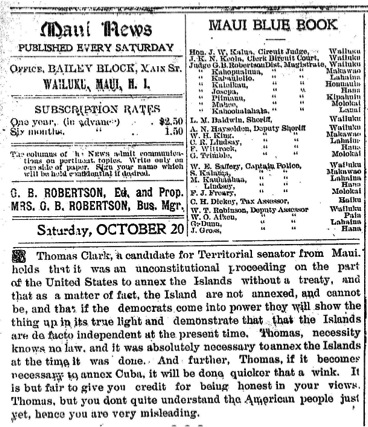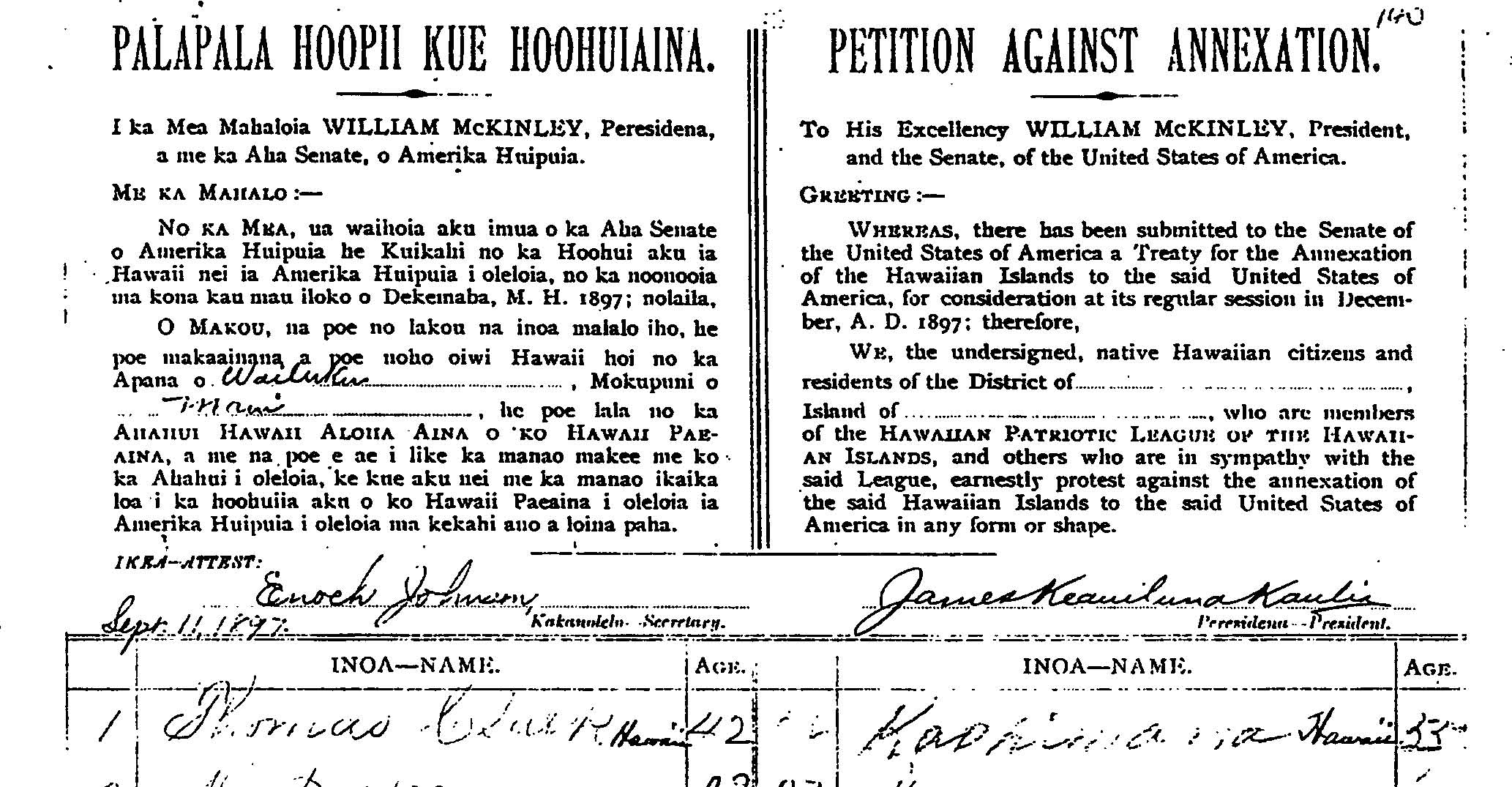Video: Tears Streaming Down the Face of a Nation
2

 On October 20, 1900, the Maui News published a commentary by its editor, George B. Robertson, that focused on Thomas Clark’s candidacy for Territorial senator from Maui. Thomas Clark was a British subject who applied for naturalization with the Minister of the Interior and was granted Hawaiian citizenship on December 23, 1867.
On October 20, 1900, the Maui News published a commentary by its editor, George B. Robertson, that focused on Thomas Clark’s candidacy for Territorial senator from Maui. Thomas Clark was a British subject who applied for naturalization with the Minister of the Interior and was granted Hawaiian citizenship on December 23, 1867.
-Follow Hawaiian Kingdom news and updates on Twitter: @HKSpokesperson
The editorial reads: “Thomas Clark, a candidate for Territorial senator from Maui, holds that it was an unconstitutional proceeding on the part of the United States to annex the Islands without a treaty, and that as a matter of fact, the Island[s] are not annexed, and cannot be, and that if the democrats come into power they will show the thing up in its true light and demonstrate that…the Islands are de facto independent at the present time. Thomas, necessity knows no law, and it was absolutely necessary to annex the Islands at the time it was done. And further, Thomas, if it becomes to annex Cuba, it will be quicker tha[n] a wink. It is but fair to give you credit for being honest in your views, Thomas, but you don’t quite understand the American people just yet, hence you are very misleading.”
Thomas Clark was from Wailuku, Maui, and he was a signatory on the 1897 Hawaiian Patriotic League’s Petition against Annexation. He was 42 years of age when he signed the petition on page 245, September 11, 1897. You will notice next to his signature is written “Hawaiian” because Thomas Clark, although formerly British, was a Hawaiian subject.
 The reason for the petition was because on June 16, 1897, President William McKinley signed a treaty of annexation with insurgents from Hawai‘i and was preparing to submit it to the United States Senate for approval when it reconvenes in December 1897. McKinley ignored the June 17, 1897 diplomatic protest from Queen Lili‘uokalani, and the July 24, 1897 protests from the Hawaiian Patriotic League (Hui Aloha ‘Aina) and the Hawaiian Political Association (Hui Kalai‘aina). This resulted in activating the Hawaiian Patriotic League and the Hawaiian Political Association in order to gather signatures from the people. According to the 1890 government census, the national citizenry numbered 48, 107. The Patriotic League gathered 21,269 signatures and the Political Association gathered 17,000. The two organizations agreed to only submit the Patriotic League’s petition because the Political Association’s petition could be viewed by the Senate as too pro-monarchy.
The reason for the petition was because on June 16, 1897, President William McKinley signed a treaty of annexation with insurgents from Hawai‘i and was preparing to submit it to the United States Senate for approval when it reconvenes in December 1897. McKinley ignored the June 17, 1897 diplomatic protest from Queen Lili‘uokalani, and the July 24, 1897 protests from the Hawaiian Patriotic League (Hui Aloha ‘Aina) and the Hawaiian Political Association (Hui Kalai‘aina). This resulted in activating the Hawaiian Patriotic League and the Hawaiian Political Association in order to gather signatures from the people. According to the 1890 government census, the national citizenry numbered 48, 107. The Patriotic League gathered 21,269 signatures and the Political Association gathered 17,000. The two organizations agreed to only submit the Patriotic League’s petition because the Political Association’s petition could be viewed by the Senate as too pro-monarchy.
The Patriotic League’s Petition was entered into the record of the United States Senate by Massachusetts Senator George Fisbie Hoar when it convened in December of 1897. As a result of these signature petitions, the Senate could not garner 2/3’s of the Senators to ratify the McKinley treaty. By March the treaty was dead. On July 7, 1898, a joint resolution of annexation was signed by President McKinley purporting to annex the Hawaiian Islands justified as a war measure, but Congressional legislation has no force and effect beyond the borders of the United States. (See U.S. State of Hawai‘i is a War Crime under International Law). Thomas Clark knew this.
Propaganda was effectively used to disguise the occupation of the Hawaiian Kingdom as if the Hawaiian Islands were annexed by a treaty and made a part of the United States. Thomas Clark knew the Hawaiian Kingdom was still independent, but propaganda did not spare the generations after.
On August 4, 1961, Stanley Ann Dunham, a United States citizen from Wichita, Kansas, gave birth to Barack Hussein Obama, II, at Kapi‘olani Maternity & Gynecological Hospital in the city of Honolulu, Island of O‘ahu, Hawaiian Kingdom. His father, Barack Hussein Obama, was a British subject from Kenya, East Africa. Kapi‘olani Hospital was established in 1890 by Queen Kapi‘olani, husband to the Head of State, King David Kalakaua.
President Barack Obama was elected as the 44th President of the United States and took office on January 20, 2009 and in 2012 was reelected for a second term to begin on January 20, 2013. Article II of the United States Constitution states “No person except a natural born Citizen…shall be eligible to the Office of President.” President Obama was born in the Hawaiian Kingdom not the United States.
-Follow Hawaiian Kingdom news and updates on Twitter: @HKSpokesperson
The Birthers claim that President Barrack Obama is not a natural born citizen of the United States. In Steve Ankeny and Bill Kruse v. Governor of the State of Indiana, a Birther case that was appealed to the Indiana Court of Appeals, the Court concluded on November 12, 2009: “Based upon the language of Article II, Section 1, Clause 4 and the guidance provided by Wong Kim Ark, we conclude that persons born within the borders of the United States are “natural born Citizens” for Article II, Section 1 purposes, regardless of the citizenship of their parents. Just as a person “born within the British dominions [was] a natural-born British subject” at the time of the framing of the U.S. Constitution, so too were those “born in the allegiance of the United States [ ] natural-born citizens.” The Court concluded the President was a natural born citizen because he was born in the State of Hawai‘i, which is within the borders of the United States.
The borders of the United States was established by international treaties and the States of the Union, including the State of Indiana wherein the Appellate Court is situated, all originate from international treaties by Great Britain, France, Spain, Mexico, Russia, Germany and Denmark. Here follows the treaties that formed the United States of America with the States of the Union and territories that are directly linked.
The decision by the Indiana Court of Appeals assumes that Hawai‘i is “within the borders of the United States.” The evidence relied on to support this assumption is An Act To provide for the admission of the State of Hawai‘i into the Union (March 18, 1959) and the Joint Resolution To provide for annexing the Hawaiian Islands to the United States (July 7, 1898). The 1959 Statehood Act and the 1898 Joint Resolution are both Congressional laws that have no force and effect beyond the borders of the United States. (See U.S. State of Hawai‘i is a War Crime under International Law).
For the Hawaiian Islands to be within the borders of the United States there needs to be a treaty of cession. THERE IS NO TREATY BY HAWAI‘I, ONLY THE PROPAGANDA OF A TREATY. Here are some examples of the propaganda.
The Hawaiian Kingdom, a sovereign and independent State since November 28, 1843, has been under an illegal and prolonged occupation by the United States since August 12, 1898 during the Spanish-American War. View Dr. Sai’s interview at the United Nations news agency South-South News in New York City, also visit hawaiiankingdom.org.
The international laws of occupation prevents those born within the territory of an occupied State from acquiring the occupied State’s nationality/citizenship. Acquisition of nationality/citizenship in an occupied State is by jus sanguinis (nationality of the parents). Barack Obama was born a dual-citizen—American citizenship from his mother and British citizenship from his father. He is not a natural-born citizen because he was not “born within the borders of the United States.” Barack Obama is an American citizen by parentage, but not natural born.
The Birthers are right, but for the wrong reason.
 In 2011, David Keanu Sai, Ph.D., Hawaiian Ambassador-at-large, has written a new Hawaiian history book, Ua Mau Ke Ea: Sovereignty Endures, covering the legal and political history of the Hawaiian Kingdom that spans from the 18th century to the present. The textbook also comes with an accompanying DVD. Dr. Sai has a Ph.D. in political science specializing in international relations and public law. The textbook and DVD can be purchased online.
In 2011, David Keanu Sai, Ph.D., Hawaiian Ambassador-at-large, has written a new Hawaiian history book, Ua Mau Ke Ea: Sovereignty Endures, covering the legal and political history of the Hawaiian Kingdom that spans from the 18th century to the present. The textbook also comes with an accompanying DVD. Dr. Sai has a Ph.D. in political science specializing in international relations and public law. The textbook and DVD can be purchased online.
-Follow Hawaiian Kingdom news and updates on Twitter: @HKSpokesperson
Ua Mau Ke Ea: Sovereignty Endures is required reading for classes at the University of Hawai’i Colleges and High Schools throughout the Hawaiian Islands. Here are some comments from High School and College instructors:
After two failed attempts to acquire the Hawaiian Islands by a treaty of cession as required by international law, the U.S. Congress “unilaterally” enacted a Joint Resolution purporting to annex the Hawaiian Islands, which was signed into law by President McKinley on July 7, 1898 during the Spanish-American War as a war measure.
-Follow Hawaiian Kingdom news and updates on Twitter: @HKSpokesperson
On June 15, 1898, during debates over the joint resolution annexing Hawai‘i in the House of Representatives, Congressman Thomas H. Ball (D-Texas) stated, “The annexation of Hawai‘i by joint resolution is unconstitutional, unnecessary, and unwise. If the first proposition be true, sworn to support the Constitution, we should inquire no further. I challenge not the advocates of Hawaiian annexation, but those who advocate annexation in the form now presented, to show warrant or authority in our organic law for such acquisition of territory. To do so will be not only to subvert the supreme law of the land but to strike down every precedent in our history. …Why, sir, the very presence of this measure here is the result of a deliberate attempt to do unlawfully that which can not be done lawfully.”
And on June 20, 1898, during Senate debates over the joint resolution annexing Hawai‘i, Senator Augustus Bacon (D-Georgia) stated, “That a joint resolution for the annexation of foreign territory was necessarily and essentially the subject matter of a treaty, and that it could not be accomplished legally and constitutionally by a statute or joint resolution. If Hawaii was to be annexed, it ought certainly to be annexed by a constitutional method; and if by a constitutional method it can not be annexed, no Senator ought to desire its annexation sufficiently to induce him to give his support to an unconstitutional measure.” Senator Bacon further explained, “Now, a statute is this: A Statute is a rule of conduct laid down by the legislative department, which has its effect upon all of those within the jurisdiction. In other words, a statute passed by the Congress of the United States is obligatory upon every person who is a citizen of the United States or a resident therein. A statute can not go outside the jurisdiction of the United States and be binding upon the subjects of another power. It takes the consent of the subjects of the other power, speaking or giving their consent through their duly authorized government, to be bound by a certain thing which is enacted in this country; and therein comes the necessity for a treaty. ”
The United States Congress was fully aware that a joint resolution is not a cession of territory by treaty, but only an opinion or will of the U.S. Congress limited in authority to territory of the United States. The Hawaiian Kingdom was not annexed to the United States and remained an independent, but occupied State.
Usurping Hawaiian sovereignty, U.S. President McKinley signed into United States law An Act To provide a government for the Territory of Hawai’i on April 30, 1900; and on March 18, 1959, U.S. President Eisenhower signed into United States law An Act To provide for the admission of the State of Hawai’i into the Union.
According to the United States Supreme Court, in United States v. Curtiss-Wright Export Corp., (1936), “Neither the Constitution nor the laws passed in pursuance of it have any force in foreign territory unless in respect of our own citizens; and operations of the nation in such territory must be governed by treaties, international understandings and compacts, and the principles of international law…. [T]he court recognized, and in each of the cases cited [involving the exercise of the sovereign power of the United States] found, the warrant for its conclusions not in the provisions of the Constitution, but in the law of nations”.
United States laws are not only limited to United States territory, but the 1898 joint resolution of annexation, the 1900 Territorial Act, and the 1959 Hawai‘i Statehood Act stand in direct violation of the 1893 Lili`uokalani assignment and the Restoration Agreement, being international compacts, the 1907 Hague Convention, IV, and the 1949 Geneva Convention, IV.
According to the United Nations War Crimes Commission “war crimes” include:
Usurpation of sovereignty is to illegally take by force the sovereignty of another country. International tribunals and national tribunals prosecuted both military and civilians after World War I and World War II for these war crimes. The State of Hawai’i government, established by an Act of Congress in 1959, is a usurpation of sovereignty during occupation and therefore not only illegal but also constitutes a war crime.
When the Hawaiian Kingdom deposited its Instrument of Accession with the United Nations Secretary-General on December 10, 2012 in New York City, the International Criminal Court (ICC) will possess jurisdiction over Hawaiian territory beginning on March 4, 2013. According to Article 126 of the Rome Statute, the ICC will have jurisdiction “on the first day of the month after the 60th day following the date of the deposit of the…instrument of…accession.”
-Follow Hawaiian Kingdom news and updates on Twitter: @HKSpokesperson
The ICC prosecutes individuals and not states for war crimes committed within occupied territories. Only states can accede to the jurisdiction of the ICC, and that Hawai‘i achieved the international recognition of its statehood on November 28, 1843 by joint proclamation of Great Britain and France and entered into extensive diplomatic relations and treaties with other states.
The justification for the accession was based on two points: first, the acting government is not able to enforce and prosecute individuals for violating Hawaiian law and the law of occupation taking place within Hawaiian territory; and second, the U.S. Pacific Command has refused to hold to account individuals for committing war crimes that have been reported since July 6, 2012.
UPDATE: According to the Rome Statute, the International Criminal Court’s (ICC) jurisdiction is limited to events taking place since July 1, 2002, which is the date the ICC came into existence. Since the Hawaiian Kingdom acceded to the ICC’s Rome Statute on December 10, 2012, the Rome Statute provides that jurisdiction for the ICC will begin on March 4, 2012. The Hawaiian Kingdom, however, can accept the jurisdiction of the ICC for the period before March 4, 2012, which will include events that have transpired since July 1, 2002. At this time, the Hawaiian Kingdom has not done so, but does reserve that right.
 This afternoon the Ambassador-at-large and Agent for the acting government of the Hawaiian Kingdom, H.E. David Keanu Sai, Ph.D., filed with the United Nations Secretary General in New York an instrument of accession acceding to the jurisdiction of the International Criminal Court (ICC) at the Hague, Netherlands. The ICC is a permanent and independent tribunal in The Hague, Netherlands, that prosecutes individuals for genocide, crimes against humanity and war crimes. The ICC only prosecutes individuals and not States.
This afternoon the Ambassador-at-large and Agent for the acting government of the Hawaiian Kingdom, H.E. David Keanu Sai, Ph.D., filed with the United Nations Secretary General in New York an instrument of accession acceding to the jurisdiction of the International Criminal Court (ICC) at the Hague, Netherlands. The ICC is a permanent and independent tribunal in The Hague, Netherlands, that prosecutes individuals for genocide, crimes against humanity and war crimes. The ICC only prosecutes individuals and not States.
-Follow Hawaiian Kingdom news and updates on Twitter: @HKSpokesperson
The instrument of accession was deposited with the United Nations Secretary-General in accordance with Article 125(3) of the ICC Rome Statute, which provides, “This Statute shall be open to accession by all States. Instruments of accession shall be deposited with the Secretary-General of the United Nations.” By acceding to the ICC Rome Statute, the Hawaiian Kingdom, as a State, accepted the exercise of the ICC’s jurisdiction over war crimes committed within its territory by its own nationals as well as war crimes committed by nationals of States that are not State Parties to the ICC Rome Statute, such as the United States of America. According to Article 13 of the ICC Rome Statute, the Court may exercise its jurisdiction if a situation is referred to the ICC’s Prosecutor by the Hawaiian Kingdom who is now a State Party by accession.
The current situation in the Hawaiian Islands arises out of the prolonged and illegal occupation of the entire territory of the Hawaiian Kingdom by the United States of America since the Spanish-American War on August 12, 1898, and the failure on the part of the United States of America to establish a direct system of administering the laws of the Hawaiian Kingdom. The United States disguised its occupation of the Hawaiian Kingdom as if a treaty of cession annexed the Hawaiian Islands. There is no treaty.
Individuals of the State of Hawai‘i government who committed war crimes have already been reported to the United States Pacific Command and the United Nations Human Rights Commission in Geneva, Switzerland, for deliberately denying a fair and regular trial to Defendants, irrespective of nationality, and with the Hawaiian Kingdom’s accession to the jurisdiction of the ICC, these alleged war criminals will now come under the prosecutorial authority of the Prosecutor of the ICC.
Regarding the occupation of Hawaiian territory, the ICC is authorized under the Rome Statute to prosecute individuals for committing the following war crimes during an occupation:
 On October 19, 2012, after a meeting with H.E. Peter Thomson, Fiji’s Permanent Representative and Ambassador to the United Nations in New York, Hawaiian Ambassador-at-large, H.E. David Keanu Sai, Ph.D., was called to an interview with the United Nations South-South News regarding Hawai‘i’s prolonged and illegal occupation by the United States.
On October 19, 2012, after a meeting with H.E. Peter Thomson, Fiji’s Permanent Representative and Ambassador to the United Nations in New York, Hawaiian Ambassador-at-large, H.E. David Keanu Sai, Ph.D., was called to an interview with the United Nations South-South News regarding Hawai‘i’s prolonged and illegal occupation by the United States.
-Follow Hawaiian Kingdom news and updates on Twitter: @HKSpokesperson
South-South News is an initiative launched in February 2010 during the sixteenth session of the United Nation General Assembly High-level Committee on South-South Cooperation (SSC). The purpose for South-South News is to advance the implementation of the Millennium Development Goals (MDGs) through the sharing of best practices in the areas of South-South and Triangular Cooperation. South-South News disseminates news about Africa, Asia and the Pacific, Middle East, Eastern Europe, Latin America, and the Caribbean. South-South News is a digital media platform for the countries of the South that is facilitating, connecting, and publishing news on various efforts in sustainable economic and social development to audiences and multiple constituencies not only in the South but also around the world.
 On Friday afternoon, August 10, 2012, the Ambassador-at-large and Agent for the acting government of the Hawaiian Kingdom, H.E. David Keanu Sai, Ph.D., filed with the President of the United Nations General Assembly at United Nations headquarters in New York a Protest and Demand with 55 Annexes against the United States of America concerning the prolonged occupation of the Hawaiian Islands since the Spanish American War of 1898, and 172 member-States of the United Nations. All the named States in the Protest have treaty relations with the Hawaiian Kingdom either as States or as successor States to their predecessor. There are forty-six (46) States and one hundred twenty-seven (127) successor States that have treaty relations with the Hawaiian Kingdom.
On Friday afternoon, August 10, 2012, the Ambassador-at-large and Agent for the acting government of the Hawaiian Kingdom, H.E. David Keanu Sai, Ph.D., filed with the President of the United Nations General Assembly at United Nations headquarters in New York a Protest and Demand with 55 Annexes against the United States of America concerning the prolonged occupation of the Hawaiian Islands since the Spanish American War of 1898, and 172 member-States of the United Nations. All the named States in the Protest have treaty relations with the Hawaiian Kingdom either as States or as successor States to their predecessor. There are forty-six (46) States and one hundred twenty-seven (127) successor States that have treaty relations with the Hawaiian Kingdom.
-Follow Hawaiian Kingdom news and updates on Twitter: @HKSpokesperson
The Protest and Demand with 55 Annexes was filed with the General Assembly in accordance with Article 35(2) of the United Nations Charter, which provides, “a State which is not a Member of the United Nations may bring to the attention of the Security Council or of the General Assembly any dispute to which it is a party if it accepts in advance, for the purpose of the dispute, the obligations of pacific settlement provided in the present Charter.” The Hawaiian Kingdom is a non-Member State of the United Nations.
The Protest and Demand calls upon the United Nations General Assembly:
The Hawaiian Kingdom will withdraw States named in the Protest and Demand, with the exception of the United States of America, when these States shall declare, whether individually or collectively, that they will not recognize as lawful the United States of America’s presence and authority within the territory, territorial seas, exclusive economic zone and airspace of the Hawaiian Kingdom according to Article 41(2), Responsibility of States for International Wrongful Acts (2001), except for the United States’ temporary and limited authority vested by virtue of the 1893 Lili‘uokalani assignment, Article 43 of the 1907 Hague Convention, IV, and international law.
On August 1, 2012, the acting government of the Hawaiian Kingdom appointed David Keanu Sai, Ph.D., its Ambassador-at-large. Dr. Sai has a Ph.D. in political science specializing in international relations and public law.
-Follow Hawaiian Kingdom news and updates on Twitter: @HKSpokesperson
Dr. Sai originally founded the acting government of the Hawaiian Kingdom on March 1, 1996, with Donald Lewis and Nai‘a Ulumaimalu, Trustees of the Hawaiian Kingdom Trust Company. Dr. Sai also served as lead agent for the Hawaiian Kingdom in international arbitral proceedings before the Permanent Court of Arbitration, Larsen v. Hawaiian Kingdom (1999-2001). The Arbitral Tribunal in the Larsen arbitration comprised of Professor James Crawford, SC, Presiding Arbitrator, who at the same time was a member of the United Nations International Law Commission and Special Rapporteur on State Responsibility (1997-2001); Professor Christopher Greenwood, QC, Associate Arbitrator, who now serves as a Judge on the International Court of Justice since February 6, 2009; and Gavan Griffith, QC, Associate Arbitrator, who served as former Solicitor General for Australia. The jurisdictional basis of the Permanent Court of Arbitration in Larsen v. Hawaiian Kingdom was a dispute between a State and a private person.
Dr. Sai also served as agent for the acting government when a Complaint was filed against the United States of America with the United Nations Security Council on July 5, 2001, under the Presidency of China.